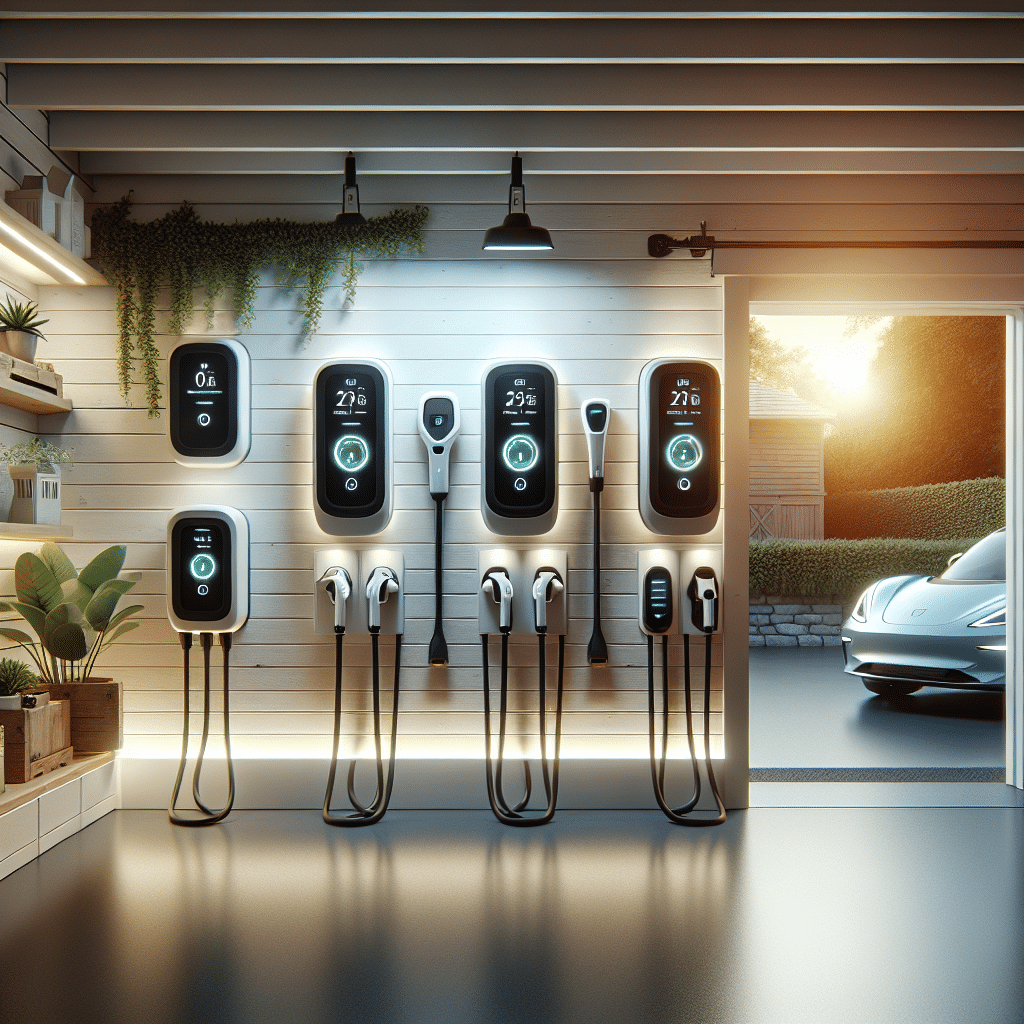Understanding EV Charger Types
When considering the fastest EV chargers for home use, it’s essential to understand the three main types: Level 1, Level 2, and DC Fast Chargers. Level 1 chargers utilize standard 120-volt outlets, providing minimal charging speed—around 4 to 5 miles of range per hour. Level 2 chargers, running on 240-volt outlets, are much faster, typically delivering 25 to 30 miles of range per hour. These are the most common options for home installations. DC Fast Chargers are designed primarily for commercial or public use, providing rapid charging capabilities and can bring an EV to 80% charge in under an hour; however, they are not typically installed in residential settings.
Top Fastest EV Chargers for Home Use
-
ChargePoint Home Flex
- Charging Speed: Up to 50 amps
- Estimated Range Per Hour: Up to 37 miles
- Features: This flexible, smart Level 2 charger adapts to various power levels, making it suitable for different electrical setups. Users can connect it to Wi-Fi, allowing for control via the ChargePoint app. Smart scheduling and notifications enhance the charging experience, and it’s compatible with all EV models.
-
JuiceBox Pro 40
- Charging Speed: Up to 40 amps
- Estimated Range Per Hour: Up to 30 miles
- Features: JuiceBox Pro 40 comes with Wi-Fi connectivity, enabling remote management through a smartphone app. The built-in scheduling feature allows users to charge overnight or during off-peak hours, saving money on electricity bills. A rugged design also allows outdoor installation.
-
BMW Wallbox
- Charging Speed: Up to 40 amps
- Estimated Range Per Hour: Approximately 30 miles
- Features: Known for its sleek design, the BMW Wallbox is perfect for BMW EV users but is compatible with all EV models. Its compact nature allows for more flexible installation options. It also includes smart technology for charge management and can be connected to a dedicated app for tracking charging sessions.
-
Siemens VersiCharge
- Charging Speed: Up to 30 amps
- Estimated Range Per Hour: Up to 25 miles
- Features: Siemens VersiCharge is known for its robust build quality and easy installation. It has adjustable power levels, allowing users to customize charging speed based on their home’s electrical capacity. This charger also features a 24-foot charging cable for added convenience.
Key Features to Consider
- Power Output: More amps mean faster charging speeds. The average home can handle up to 40 amps through a dedicated circuit, providing optimal charging.
- Smart Connectivity: Many modern chargers offer Wi-Fi or Bluetooth connectivity, allowing users to monitor charging status, schedule charging times, and receive notifications via mobile apps.
- Installation Requirements: It’s crucial to assess your home’s wiring system. Level 2 chargers often require a dedicated circuit, so consult with a qualified electrician to understand installation costs and requirements.
- Connector Type: Ensure compatibility with your EV’s connector type. The most common connectors in North America are J1772 for Level 2 chargers and proprietary connectors for specific brands (like Tesla).
Installation Tips for Home EV Chargers
-
Consult with an Electrician: Before purchasing a charger, have a professional assess your home’s electrical capacity. This can help in selecting the right charger and ensuring a safe installation.
-
Choose an Accessible Location: Install the charger in an easily accessible location, ideally close to where you typically park your EV. This makes plugging in more convenient.
-
Weatherproofing for Outdoor Chargers: If you choose to install a charger outside, ensure it is rated for outdoor use to withstand humidity, rain, and extreme temperatures.
-
Utilize Smart Features: Take advantage of smart features in chargers to maximize efficiency, such as charging during off-peak hours. This can reduce costs significantly.
Benefits of Fast EV Chargers for Home Use
- Convenience: Having a charger at home means you can start each day with a full battery, alleviating range anxiety.
- Cost-Effective Charging: Home charging can often be cheaper than public charging, especially if you utilize off-peak energy rates.
- Increased Property Value: Installing a home EV charger can enhance property value and attractiveness for future buyers, especially those interested in sustainable living.
Popular Brands and Models
- ClipperCreek HCS-40: With a 32 amp output, this charger is popular among EV owners for its reliability and ease of use.
- Wallbox Pulsar Plus: This compact charger offers great flexibility with up to 40 amps of power, and features an intuitive app for easy monitoring.
- Grizzl-E Level 2 Charger: Known for its rugged design, this charge provides up to 40 amps and is suited for outdoor installation.
Understanding Charging Time
Charging time can significantly vary depending on the charger’s power output and the vehicle’s battery capacity. For instance, charging a vehicle with a 60 kWh battery using a 40-amp charger typically takes about 5 to 6 hours for a full charge, while smaller batteries will take less time.
Maintenance of Home EV Chargers
Regular maintenance of your home EV charger ensures longevity and performance. Check connections for wear and tear, keep the unit clean from dirt and debris, and ensure that software updates are applied if your charger has smart features.
Final Considerations
Choosing the fastest EV charger for home use involves assessing your specific needs, including your vehicle’s requirements, your home’s electrical infrastructure, and how often you plan to charge your vehicle. Ultimately, investing in a reliable and efficient charger can enhance your overall EV experience and encourage a sustainable lifestyle.
